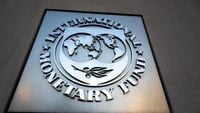The International Monetary Fund (IMF) has significantly revised its global economic forecasts, attributing the downturn to the aggressive tariff policies initiated by US President Donald Trump. The IMF now predicts a global growth rate of only 2.8 percent for 2025, a stark decline from the 3.3 percent it projected in January. This adjustment reflects the ongoing trade war and its repercussions on economies worldwide.
In its latest report, released during the IMF's spring meeting in Washington, the organization highlighted that the US economy is expected to grow by just 1.8 percent in 2025 and 1.7 percent in 2026. These figures represent a reduction of 0.9 and 0.4 percentage points, respectively, compared to earlier forecasts. The IMF noted that the uncertainty generated by the tariffs has dampened consumer confidence, which has traditionally supported the US economy.
Germany, too, is feeling the impact of these trade tensions. The IMF forecasts zero growth for the German economy in 2025, making it the slowest-growing economy among the G7 nations. This projection is 0.3 percentage points lower than earlier estimates. While the IMF is slightly more optimistic about 2026, predicting a growth rate of 0.9 percent, this is still 0.2 percentage points less than previously anticipated.
According to the IMF, the Eurozone's economic growth is also set to decline, with a forecast of 0.8 percent for 2025, down 0.2 percentage points from January. The IMF attributes this slowdown to the ongoing uncertainty and the effects of tariffs. Looking ahead, Eurozone growth is expected to improve to 1.2 percent in 2026, but this too is a downward revision of 0.2 percentage points.
IMF Chief Economist Pierre-Olivier Gourinchas emphasized the precarious state of the global economy, stating, "The global economy is at a critical juncture." He pointed out that the combination of tariffs and counter-tariffs has pushed tariff rates to a century high, creating a complex web of economic challenges.
The IMF's report also highlights the potential for rising inflation as a result of these trade disputes. The organization has adjusted its inflation forecasts upward, predicting that inflation in advanced economies will average 2.5 percent in 2025, which is 0.4 percentage points higher than previous estimates.
Despite the grim outlook, the IMF has not forecasted a recession. Instead, it has prepared three different scenarios based on varying levels of trade tensions. The reference forecast, which includes all tariff announcements up to April 4, 2025, still projects global growth of 2.8 percent for this year and 3 percent for the following year.
However, the IMF warns that the current trade policies could unravel global supply chains and financial flows, leading to significant economic disruptions. The interconnectedness of today’s global economy means that the fallout from the trade war could be felt far and wide, affecting not only the US and China but also numerous countries in Asia and Europe.
China's economy is also under pressure, with the IMF projecting a growth rate of 4 percent for both 2025 and 2026, down 0.6 and 0.5 percentage points, respectively. The trade war has severely impacted China's economy, particularly its real estate sector, which is already struggling.
In Russia, the IMF forecasts a growth rate of 1.5 percent for 2025, slightly improved from previous estimates, but still indicative of a slowdown due to declining consumer spending and investment.
As the IMF continues to monitor the situation, it urges countries to de-escalate their current tariff policies and collaborate to restore clarity and stability in trade relations. The organization believes that such measures could improve economic prospects almost immediately.
In conclusion, the IMF's latest forecasts paint a concerning picture of the global economy, heavily influenced by the ongoing trade war initiated by the US. As countries grapple with the implications of these policies, the potential for a more interconnected economic downturn remains a pressing concern for policymakers worldwide.








